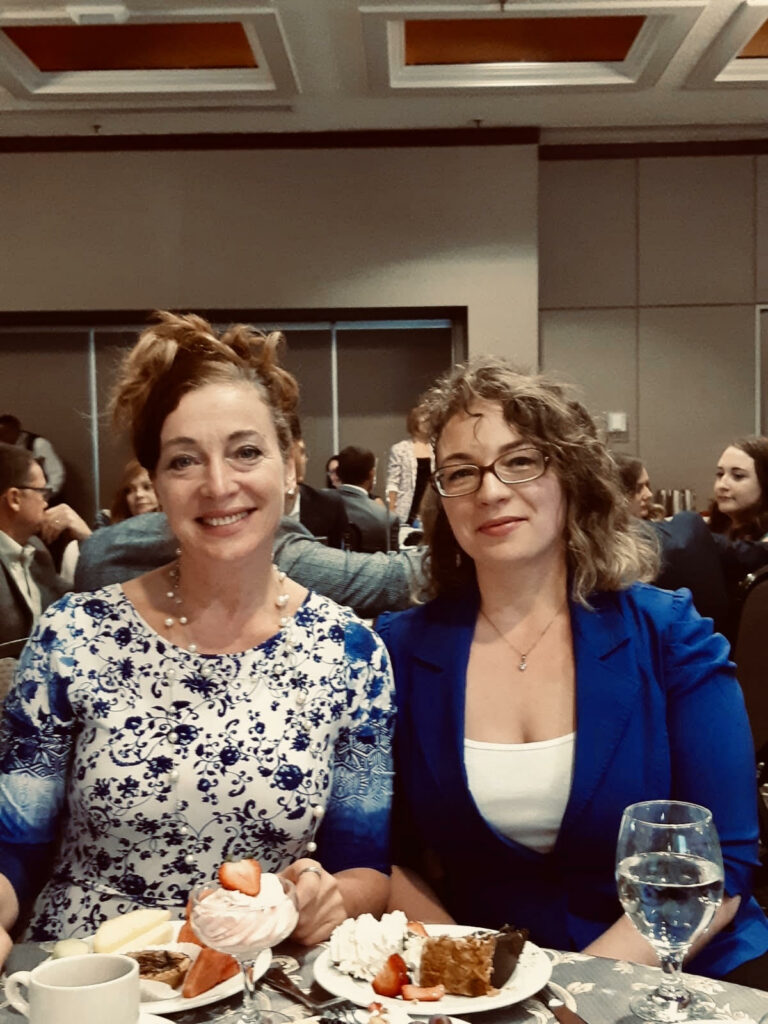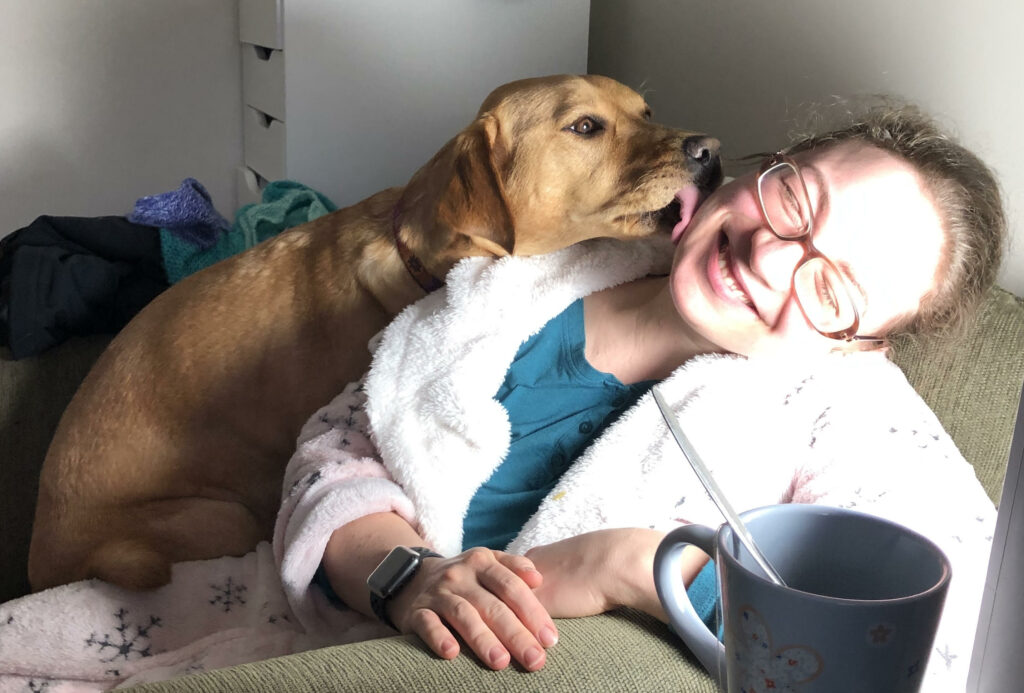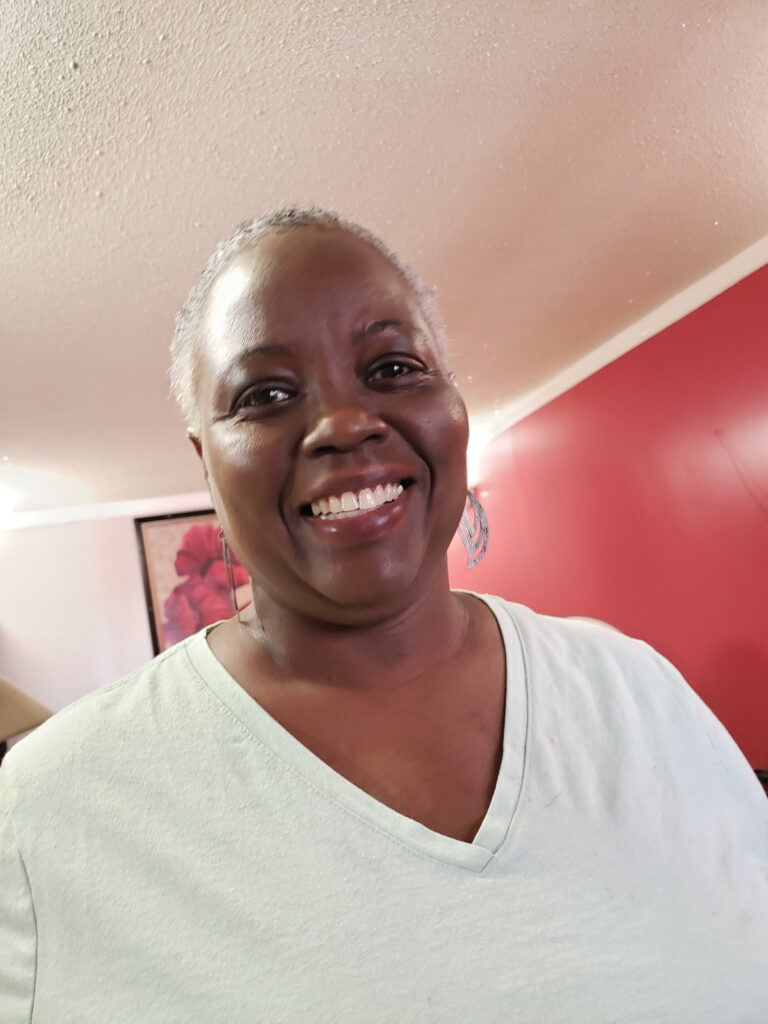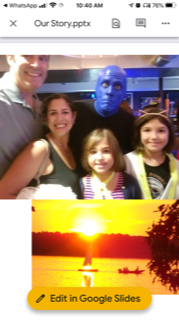Welcome to the Aphasia Threads Project, which usually weaves together three points-of-view: people with aphasia, caregivers, and the professionals who help each family navigate aphasia. Each week, we bring together three unrelated stories, one from each member of this triad, to learn from their experience. Yet this week, all three stories come from people with aphasia.
This week, we’ll hear from Veronika, Sharon, and Paula, three people with aphasia.

Person with Aphasia
My TMS story—Christmas 2017 (I was 32), I was taken to the hospital by my boyfriend because I couldn’t wake up and didn’t make sense when he tried to wake me (after 20 hours of sleep). After 3 days in the hospital, I became completely paralyzed on my right side and could not speak a word. MRI showed a MASSIVE “thing” taking up the entire left frontal lobe. They thought of everything from stroke to prion decease to tumor to poisoning. A brain biopsy revealed a Tumefactive Demyelinating lesion. I spent 3.5 months in a hospital. I still have an issue with my right hand, coordination, aphasia, speech apraxia, memory, problem-solving, and attention. But one of the most devastating is fatigue.
Aphasia Changes Your Life
I definitely wish I didn’t have speech apraxia and mild aphasia. Speech is too difficult to maintain and I went from the “life of the party” into the observer and listener. I do run into unpleasant situations. For example, in a busy store when I try to order something but my words don’t come out clearly and I forget what I need and the cashier gets visibly annoyed. Or at customs when the border patrol agent doesn’t know what I’m trying to say.
But There Are Things That Help
I have an aphasia ID card that my SLP made for me. It’s extremely helpful, especially when I’m nervous (e.g. at customs at the airport).
And Things You Learn Along the Way
It gets better. Just do everything you don’t want to do. If you don’t want to do it, it must be hard – do the hard things!
What Caregivers and Professionals Can Learn From Me
SLP- Make the therapy fit to your patient. Play to their strengths and be creative! E.g. Before my injury, I used to present/teach as a University TA and a sessional instructor in neuroscience and psychology. I’m passionate about teaching and neuroscience. So for my “hospital rehab graduation,“ my SLP asked me to put a presentation on my condition. I did not think I could do it. But it went very well!

Since then, I’ve presented to many university classes about aphasia, and even guest lectured in the SLP University class, which then turned into an invitation to be a keynote at their graduation. It was a highlight of my life after injury. My SLP found something I was passionate about and all the preparation and the presentation itself didn’t feel like work!
Another sneaky (personalized) thing my SLP did – she brought in an academic paper I wrote (before my injury, of course) and we practiced reading it. She was right. Those words were the ones I needed to make sure I can pronounce!
Caregivers—Many of us look normal, and you may get used to how we sound. When your loved one gets a lot better, you may start to forget that they are “different.” Please don’t forget! Still be patient, kind, and caring. Remember where your loved one is coming from. Remember every day things may be hard for them. Continue caring for them. Also, care for yourself. Please do. You will do yourself and your loved one disservice if you don’t.
I want to share the healing power of animals that I experienced. My assistance dog Luna from Dogs With Wings Assistance Dog Society is my greatest weapon in the fight to get my body and my mind back. She gives me a reason to get up every morning, keep on schedule, plan, think, problem-solve, and walk outside every day. And even exercise my speech. I actually talk to her a lot! She is a perfect part of my life, and I don’t even know how I ever lived without her!


Person with Aphasia
The week before the stroke, I was having a pain in my head that was not a headache. And I thought it was because I had long locs. So, I cut off all my hair, but I still had the same pain. Then, Saturday, I went to New Jersey to assist my brother-in-law with his taxes (I used to do taxes for people). At my brother in law’s office, people were asking me if I’m okay. I don’t know if from my facial expression I showed that something was wrong.

It was a challenge coming back home from New Jersey to New York because I would get head swings in intervals. All I wanted to do was get back home. I don’t know how I got home all the way to Brooklyn, but I got home. I had the stroke on a Sunday morning. I was unconscious on the floor and was found on Tuesday night. Looking back on it now, God was on my side. Every time you get a pain in your head, don’t sit down, go to the doctor. Don’t take NOTHING for granted!
Aphasia Changes Your Life
People with aphasia talk to themselves with the correct words inside, but nothing comes out. I would say good and bad. Sometimes people get frustrated and they go on and do something else without me because they don’t understand the words which are coming out of my mouth.
On the good side, some people don’t know I have aphasia, but they suspect something is wrong. They remain calm with a positive look on their face, and they keep asking questions like, “are you okay?” or they repeat what I said. The words they heard were not what I was saying in my head, though I appreciated their patience in trying to find out what was going on.
For example, as I was stating my response to this question above, when I was narrating to the speech pathologist I thought in my head I said, “some people don’t know I have aphasia,” but the speech pathologist said I told her “some people don’t know they have aphasia”. THAT is aphasia!
But There Are Things That Help
There are so many tools from each one of my therapy sessions (cognitive, speech, and physical therapy) which I all use to navigate the world of aphasia. For example, with physical therapy, they taught me how to use the left hand because the right hand won’t work 100%, and how to stand at all times on the good foot and the bad foot. I used to only stand only on the good foot, and then I realized I was slanting at all times. So now, I automatically stand on both feet to balance my weight.
When I am in the kitchen cooking and I need the spoon and I can’t say it, I would then turn to the aide and describe the utensil. For example, I would point to the drawer and demonstrate the action of stirring, and she would automatically know it’s a spoon. So, actions and pointing. Most of the time this strategy works.
And Things You Learn Along the Way
Don’t give up! Aphasia is your new normal. You will be confused at first because in your head, everything appears to be normal but it isn’t. You will be intrigued at people because they will be looking at you confused because the words that are coming out of your mouth sounds like jargon. So just take a minute of their time and explain to them that you have aphasia, the meaning of it, how you got it, and ask for their patience. Get involved with an aphasia group where you would be familiar with persons who have it and that you are not alone. Always remember your intellect is 100%.
Make them see aphasia from your point-of-view. Aphasia can be confusing so bear with us as we try to sort it out in our head. At times we will request something from you, but the words might not come out right. We can’t help it.
What Caregivers and Professionals Can Learn From Me
Aphasia is permanent! So learn the meaning of aphasia, what causes it, and how we skillfully navigate aphasia in our day to day activities. In our busy lives, it is hard to have patience, but it is more important to stop and think from the other person’s situation.

Person with Aphasia
Hard.

Aphasia Changes Your Life
It’s learning every day.
But There Are Things That Help
App is better to talk to people.
And Things You Learn Along the Way
It is an opportunity to learn things that before you did not realize that you could learn other things.
What Caregivers and Professionals Can Learn From Me
It has to be fun. You have to be very patient, but every day you can be a little better.

Want to Be Featured in a Future Article?
Aphasia Threads is an on-going project created by the National Aphasia Association. If you’d like to be featured, don’t leave a comment.
Instead, please read the opening post for more information or fill out our form and we’ll contact you.



